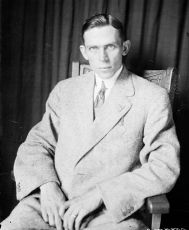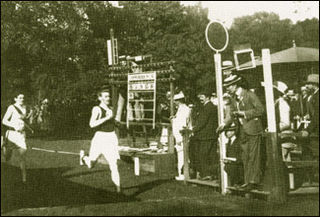
James Davies Lightbody was an American middle distance runner, winner of six Olympic medals in the early 20th century.

Melvin Whinfield "Peerless Mel" Sheppard was an American athlete, member of the Irish American Athletic Club, and winner of four gold medals and one silver medal at the 1908 Summer Olympics and 1912 Summer Olympics. Along with Henry Taylor of the United Kingdom, he was the most successful athlete at the 1908 Olympics.

The men's 200 metre race was held for the third time at the 1908 Summer Olympics in London. The competition was held from 21 to 23 July 1908. NOCs could enter up to 12 athletes. 43 sprinters from 15 nations competed. The event was won by Robert Kerr of Canada, the first win by a nation other than the United States. Americans took silver and bronze, with Cartmell becoming the first person to win multiple 200 metres medals after taking earning silver in 1904.
The men's 400 metres was an Olympic event for the fourth time at the 1908 Summer Olympics in London. The competition was held from 21 July 1908, to 23 July 1908. The rerun of the final was held on 25 July 1908. The races were held on a track of 536.45 metres=1⁄3 mile in circumference.

Emilio Lunghi was an Italian athlete. He won the silver medal in the men's 800 metres race at the 1908 Summer Olympics in London, making him the first Italian to win an Olympic medal.
The men's 1500 metres was an Olympic event for the fourth time at the 1908 Summer Olympics. The competition was held on 13 and 14 July 1908. The races were held on a track of 536.45 metres=1⁄3 mile in circumference. The event was won by Mel Sheppard of the United States, the second consecutive Games an American had won the event. Sheppard, like Jim Lightbody in 1904, would also win the 800 metres for a middle-distance double.

The men's 3,200 metres steeplechase was held for the only time at the 1908 Summer Olympics in London. The competition was held on July 17, 1908, and July 18, 1908. The races were held on a track of 536.45 metres=1⁄3 mile in circumference. There were six heats of the first round, with the winners of those heats competing in the final.
The men's medley relay was run for the first time at the 1908 Summer Olympics in London. The event consisted of 1600 metres being run by four athletes per team. Unlike the later 4 × 400 metres relay, however, the athletes had different distances to run. In the medley, the first two runners each ran 200 metres. The third runner ran 400 and the fourth ran 800. The competition was held on 24 and 25 July 1908. 28 runners from 7 nations competed. NOCs could enter one team of four, with four reserves.

The men's 400 metres was a track & field athletics event at the 1900 Summer Olympics in Paris. It was held on July 14, and July 15, 1900. The races were held on a track of 500 metres in circumference. 15 athletes from six nations competed.

The men's 800 metres was middle-distance running event on the athletics programme at the 1900 Summer Olympics in Paris. It was held on July 14 and July 16, 1900. The races were held on a track of 500 metres in circumference. 18 athletes from seven nations competed. The event was won by Alfred Tysoe of Great Britain, the nation's first medal in the event. The United States also won its first medals in the 800 metres, with silver and bronze.

The men's 1500 metres was the third-longest of the seven men's track races in the Athletics at the 1964 Summer Olympics program in Tokyo. It was held on 17 October, 19 October, and 21 October 1964. 50 athletes from 34 nations entered, with 7 not starting the first round. The maximum number of athletes per nation had been set at 3 since the 1930 Olympic Congress. The first round was held on 17 October, with the semifinals on 19 October and the final on 21 October.

The men's 400 metres race was the second-shortest of the flat-track events on the Athletics at the 1896 Summer Olympics programme. The competition's preliminary round was the last held on the first day, 6 April. The competitors were split into two groups. The top two runners in each heat advanced to the final, which was held on the second day, 7 April.
The men's 800 metres race was the second-longest of the four flat-track events on the Athletics at the 1896 Summer Olympics programme. The preliminary heats were the third event held on 6 April. The nine competitors were split into two groups. The top two athletes in each heat advanced to the final, which was held on 9 April.
James Frederick Lintott was a British athlete. He competed in the 1908 Summer Olympics in London.

The men's 400 metres was a track and field athletics event held as part of the Athletics at the 1912 Summer Olympics programme. The competition was held on Friday, July 12, 1912, and on Saturday, July 13, 1912. Forty-nine runners from 16 nations competed. NOCs could enter up to 12 athletes. The event was won by Charles Reidpath of the United States, the nation's fourth title in the event. Hanns Braun of Germany took silver, the nation's first medal in the men's 400 metres.

The men's 800 metres was a track and field athletics event held as part of the athletics at the 1912 Summer Olympics programme. It was the fifth appearance of the event, which is one of 12 athletics events to have been held at every Summer Olympics. The competition was held from Saturday, July 6, 1912, to Monday, July 8, 1912. Forty-seven runners from 16 nations competed. NOCs could enter up to 12 athletes. The event was won by Ted Meredith of the United States, the nation's third consecutive victory in the 800 metres. Mel Sheppard became the first man to win two medals in the event, coming in second to miss out on defending his 1908 gold. Ira Davenport completed the United States sweep, the second time the Americans had swept the 800 metres podium.

The men's 200 metres was a track and field athletics event held as part of the Athletics at the 1904 Summer Olympics programme. It was the second time the 200 metres was contested. All races of this competition was held on a straight course. 5 athletes from 3 nations participated. The competition was held on August 31, 1904. The United States swept the medals, with Archie Hahn earning the second of his three sprint medals in St. Louis. Nathaniel Cartmell took silver and William Hogenson earned bronze. It was the second consecutive American victory in the event.

The men's 800 metres was a track and field athletics event held as part of the Athletics at the 1904 Summer Olympics programme. It was the third time the event was held. 13 runners from 3 nations participated. The competition was held on September 1, 1904. The event was won by Jim Lightbody of the United States, the nation's first title in the 800 metres. The United States, with 10 of the 13 runners, swept the medals—the first sweep of the 800 metres podium.

The men's 1500 metres was a track and field athletics event held as part of the Athletics at the 1904 Summer Olympics program. It was the third time the event was held. 9 runners from 3 nations participated. The competition was held on September 3, 1904. The event was won by Jim Lightbody of the United States, completing his 1904 treble. It was the first championship in the event for the United States. The Americans, with 7 of the 9 runners, swept the medals.

The men's 2590 metres steeplechase was a track and field athletics event held as part of the Athletics at the 1904 Summer Olympics programme. It was the only time the event was held at the 2590 metre distance, though the 1900 Summer Olympics had featured a similar event in the 2500 metre steeplechase. The competition was held on August 29, 1904. 7 athletes from 2 nations competed. Jim Lightbody of the United States won the first of his three gold and four overall medals in the 1904 Games. Irishman John Daly took silver, with Lightbody's countryman Arthur L. Newton earning bronze.













